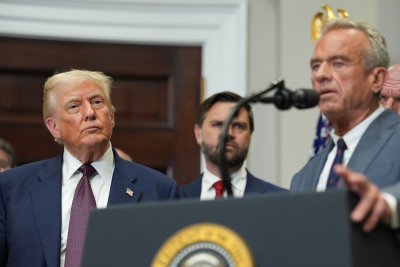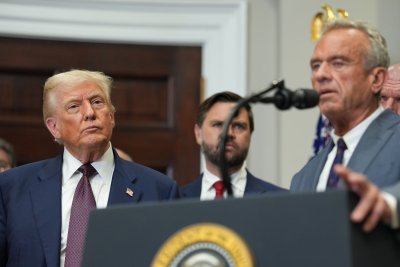
Aug. 5 (UPI) — The U.S. Department of Health and Human Services will begin pulling contracts to develop vaccines for respiratory viruses using mRNA technology, which was used for the COVID-19 shot.
Department Secretary Robert F. Kennedy Jr. announced the move in a video posted to X on Tuesday saying that it will terminate 22 contracts worth $500 million after officials determined the “technology poses more risks than benefits for these respiratory viruses.”
“Let me be absolutely clear,” said Kennedy. “HHS supports safe, effective vaccines for every American who wants them, that’s why we’re moving beyond the limitations of mRNA for respiratory viruses and investing in better solutions.”
The announcement follows other actions by Kennedy, a vocal vaccine critic, to reshape the federal government’s approach to public health in ways that have rankled mainstream health experts. Kennedy has replaced members of a vaccine advisory panel with skeptics and stopped recommending COVID-19 inoculations for healthy children, contradicting the U.S. Centers for Disease Control and Prevention’s recommendations.
The use of mRNA technology is credited with hastening the end of the COVID-19 pandemic. But its rapid development and the novelty of the technology have left lingering worries over its safety and effectiveness despite reassurances from experts. Like previous moves, Kennedy’s decision to end the contracts has drawn criticism from medical and public health experts.
“I’ve tried to be objective & non-alarmist in response to current HHS actions — but quite frankly this move is going to cost lives,” Dr. Jerome Adams, who served as Surgeon General in the first Trump administration, said in a post on X. “mRNA technology has uses that go far beyond vaccines… and the vaccine they helped develop in record time is credited with saving millions.”
Most vaccines have worked by using a weakened or dead virus to trigger a response in a patient’s immune system. Vaccines that use messenger RNA, or mRNA, instead use a molecule that causes cells to replicate a part of the virus, triggering an immune response. A new flu vaccine developed by Moderna using the technology has shown promise.
Kennedy said in his announcement that mRNA is ineffective and that vaccines using it encourage new mutations of the virus they are intended to target. He suggested the COVID-19 vaccine prolonged the pandemic and that the department would focus on research on “whole virus vaccines and novel platforms.”
Dr. Jake Scott, a clinical associate professor at Stanford University School of Medicine, said in a post on X that “the claim that mRNA vaccine technology poses more risk than benefits is simply false.”
“What poses risk is abandoning the most adaptable, scalable vaccine platform we’ve ever had,” he wrote. “Halting future development undermines pandemic preparedness at a time when we can least afford it.”
